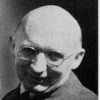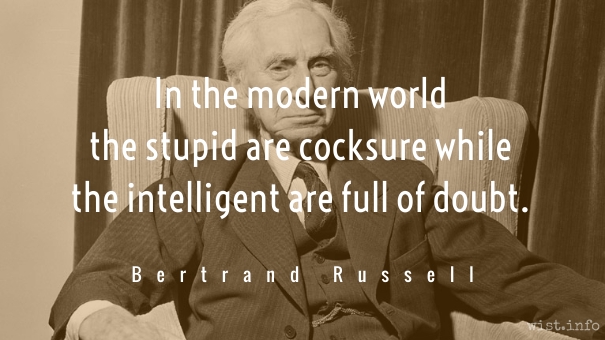There must be either a predestined Necessity and inviolable plan, or a gracious Providence, or a chaos without design or director. If then there be an inevitable Necessity, why kick against the pricks? If a Providence that is ready to be gracious, render thyself worthy of divine succour. But if a chaos without guide, congratulate thyself that amid such a surging sea thou hast a guiding Reason.
[Ἤτοι ἀνάγκη εἱμαρμένης καὶ ἀπαράβατος τάξις ἢ πρόνοια ἱλάσιμος ἢ φυρμὸς εἰκαιότητος ἀπροστάτητος. εἰ μὲν οὖν ἀπαράβατος ἀνάγκη, τί ἀντιτείνεις; εἰ δὲ πρόνοια ἐπιδεχομένη τὸ ἱλάσκεσθαι, ἄξιον σαυτὸν ποίησον τῆς ἐκ τοῦ θείου βοηθείας. εἰ δὲ φυρμὸς ἀνηγεμόνευτος, ἀσμένιζε ὅτι ἐν τοιούτῳ κλύδωνι αὐτὸς ἔχεις ἐν σαυτῷ τινα νοῦν ἡγεμονικόν.]
Marcus Aurelius (AD 121-180) Roman emperor (161-180), Stoic philosopher
Meditations, Book 12, #14 [tr. Haines (1916)]
(Source)
Original Greek. Alternate translations:
Either fate, (and that either an absolute necessity, and unavoidable decree; or a placable and flexible Providence) or all is a mere casual confusion, void of all order and government. If an absolute and unavoidable necessity, why doest thou resist? If a placable and exorable Providence, make thyself worthy of the divine help and assistance. If all be a mere confusion without any moderator, or governor, then hast thou reason to congratulate thyself; that in such a general flood of confusion thou thyself hast obtained a reasonable faculty, whereby thou mayest govern thine own life and actions.
[tr. Casaubon (1634), #11]
Either the Order of Things are fixed by irrevocable Fate, or Providence may be worked into Compassion, or else the World Floats at Raondom without any Steerage. Now if nature lies under immovable Necessity, to what purpose should you struggle against it? If the favor of Providence is to be gained, qualify your self for the Divine Assistance: But if Chance, and Confusion carry it, and no body sits at the Helm; be you contented and Ride out the Storm patiently, for you have a Governor within you , though the World has none.
[tr. Collier (1701)]
Either there is a fatal necessity and invincible order, or a kind providence, or a confusion without a purpose and without a director. If then there is an invincible necessity, why dost thou resist? But if there is a providence which allows itself to be propitiated, make thyself worthy of the help of the divinity. But if there is a confusion without a governor, be content that in such a tempest thou hast in thyself a certain ruling intelligence.
[tr. Long (1862)]
Either the order of things is fixed by irrevocable fate, or providence may be worked into compassion, or else the world floats at random without any steerage. Now if nature lies under an immovable necessity, to what purpose should you struggle against it? If the favor of providence is to be gained, qualify yourself for divine assistance; but if chance and confusion prevail, be you contented that in such a storm you have a governing intelligence within you.
[tr. Zimmern (1887)]
Either the Necessity of destiny and an order none may transgress, or Providence that hears intercession, or an ungoverned welter without a purpose. If then a Necessity which none may transgress, why do you resist? If a Providence admitting intercession, make yourself worthy of assistance from the Godhead. If an undirected welter, be glad that in so great a flood of waves you have yourself within you a directing mind.
[tr. Farquharson (1944)]
Fatal necessity, and inescapable order. Or benevolent Providence. Or confusion -- random and undirected. If it's an inescapable necessity, why resist it? If it's Providence, admits of being worshipped, then try to be worthy of God's aid. If it's confusion and anarchy, then be grateful that on this raging sea you have a mind to guide you.
[tr. Hays (2003)]
Either predetermined necessity and unalterable cosmic order, or a gracious providence, or a chaotic ungoverned mixture. If a predetermined necessity, why do you resist? If it is a gracious Providence that can hear our prayers, then make yourself worthy of divine assistance. If a chaotic ungoverned mixture, be satisfied that in the midst of this storm, you have within yourself a mind whose nature it is to govern and command.
[tr. Needleman/Piazza (2008)]
Quotations about:
intelligence
Note not all quotations have been tagged, so Search may find additional quotes on this topic.
It is man’s intelligence that makes him so often behave more stupidly than the beasts. … Man is impelled to invent theories to account for what happens in the world. Unfortunately, he is not quite intelligent enough, in most cases, to find correct explanations. So that when he acts on his theories, he behaves very often like a lunatic. Thus, no animal is clever enough, when there is a drought, to imagine that the rain is being withheld by evil spirits, or as punishment for its transgressions. Therefore you never see animals going through the absurd and often horrible fooleries of magic and religion. No horse, for example would kill one of its foals to make the wind change direction. Dogs do not ritually urinate in the hope of persuading heaven to do the same and send down rain. Asses do not bray a liturgy to cloudless skies. Nor do cats attempt, by abstinence from cat’s meat, to wheedle the feline spirits into benevolence. Only man behaves with such gratuitous folly. It is the price he has to pay for being intelligent but not, as yet, intelligent enough.
Not clamour, but love,
Not rumour but dedication,
Not violence but intelligence
Sings in the ear of God.[Non clamor, sed amor,
non vox, sed votum,
non cordula, sed cor
cantat in aure Dei]Thomas of Celano (c.1200 - c.1265) Italian friar, poet, hagiographer [Tommaso da Celano]
(Attributed)
A similar phrase -- "Not the voice but the deed, not the music of the heart but the heart, not noise but love sings in the ear of God" -- is attributed to Jordanus de Saxonia, an Augustinian hermit born in Quedlinburg in 1299.
There is nobody so irritating as somebody with less intelligence and more sense than we have.
Don Herold (1889-1966) American humorist, cartoonist, author
So Human, “Shetland Ponies vs. Autos,” epigraph (1924)
(Source)
Know the enemy, know yourself; in a hundred battles you will not be in peril.
Sun-Tzu (fl. 6th C. AD) Chinese general and philosopher [a.k.a. Sun Wu]
The Art of War, “Offensive Strategy” (31) [tr. S. Griffith (1963)]
Alt trans:
- "It is said that if you know your enemies and know yourself, you will not be imperiled in a hundred battles; if you do not know your enemies but do know yourself, you will win one and lose one; if you do not know your enemies nor yourself, you will be imperiled in every single battle." [cited ch. 3, last sentence.]
- "If you know others and know yourself, you will not be imperiled in a hundred battles; if you do not know others but know yourself, you win one and lose one; if you do not know others and do not know yourself, you will be imperiled in every single battle."
- "Know your enemy and know yourself, find naught in fear for 100 battles. Know yourself but not your enemy, find level of loss and victory. Know thy enemy but not yourself, wallow in defeat every time."
- "If you know the enemy and know yourself, you need not fear the result of a hundred battles. If you know yourself but not the enemy, for every victory gained you will also suffer a defeat. If you know neither the enemy nor yourself, you will succumb in every battle."
- Literal translation: "Know [the] other, know [the] self, hundred battles without danger; not knowing [the] other but know [the] self, one win one loss; not knowing [the] other, not knowing [the] self, every battle must [be] lost."
“What a brain, Mister Vandemar. Keen and incisive isn’t the half of it. Some of us are so sharp,” he said as he leaned in closer to Richard, went up on tiptoes into Richard’s face, “we could just cut ourselves.”
Neil Gaiman (b. 1960) British author, screenwriter, fabulist
Neverwhere, ch. 2 [Mr. Croup] (1996)
(Source)
Wear your learning, like your watch, in a private pocket; and do not pull it out and strike it, merely to show that you have one. If you are asked what o’clock it is, tell it; but do not proclaim it hourly and unasked, like the watchman.
Lord Chesterfield (1694-1773) English statesman, wit [Philip Dormer Stanhope]
Letter to his son, #142 (22 Feb 1748)
(Source)
Brute force plays a much larger part in the government of the world than it did before 1914, and what is especially alarming, force tends increasingly to fall into the hands of those who are enemies of civilization. The danger is profound and terrible; it cannot be waved aside with easy optimism. The fundamental cause of the trouble is that in the modern world the stupid are cocksure while the intelligent are full of doubt.
Bertrand Russell (1872-1970) English mathematician and philosopher
“The Triumph of Stupidity,” New York American (1933-05-10)
(Source)
Often paraphrased, "The trouble with the world is that the stupid are cocksure, and the intelligent are full of doubt." See also Yeats and Bukowski.
More examination of this quotation: The Best Lack All Conviction While the Worst Are Full of Passionate Intensity – Quote Investigator.
One thing that humbles me deeply is to see that human genius has its limits while human stupidity does not.
[Une chose qui m’humilie profondément est de voir que le génie humain a des limites, quand la bêtise humaine n’en a pas.]
Alexandre Dumas, fils (1824-1895) French writer and dramatist
(Attributed)
(Source)
Earliest attribution is in the Great Universal Dictionary of the Nineteenth Century [Grand Dictionnaire Universel du XIXe Siècle], Vol. 2, "Stupidity [Bêtise]" (c. 1865)
Attributed to a wide variety of individuals, including (spuriously) to Albert Einstein.
Variants:
- "What distresses me is to see that human genius has limitations, and human stupidity has none."
- "How despairing it is to see that human genius has limitations, while human stupidity has none."
- "The difference between genius and stupidity is that genius has its limits."
- "Human genius has its limits, but stupidity does not."
- "Genius may have its limitations, but stupidity is not thus handicapped." (Elbert Hubbard, ed., The Philistine, title epigraph (Sep 1906)
See here for more discussion.
For it is not enough to have a good mind; the main thing is to apply it well. The greatest souls are capable of the greatest vices as well as the greatest virtues; and those who proceed but very slowly can make much greater progress, if they always follow the right path, than those who hurry and stray from it.
[Car ce n’est pas assez d’avoir l’esprit bon, mais le principal est de l’appliquer bien. Les plus grandes âmes sont capables des plus grands vices aussi bien que des plus grandes vertus; et ceux qui ne marchent que fort lentement peuvent avancer beaucoup davantage, s’ils suivent toujours le droit chemin, que ne font ceux qui courent et qui s’en éloignent.]
René Descartes (1596-1650) French philosopher, mathematician
Discourse on Method [Discours de la méthode], Part 1 (1637) [tr. Cottingham, Stoothoff (1985)]
(Source)
Sometimes quoted "the main thing is to use it well." (Source (French)). Alternate translations:
For ’tis not enough to have good faculties, but the principal is, to apply them well. The greatest Souls are as capable of the greatest Vices, as of the most eminent Vertues: And those who move but very slowly, may advance much farther, if they always follow the right way; then those who run and straggle from it.
[tr. Newcombe ed. (1649)]
For to be possessed of a vigorous mind is not enough; the prime requisite is rightly to apply it. The greatest minds, as they are capable of the highest excellences, are open likewise to the greatest aberrations; and those who travel very slowly may yet make far greater progress, provided they keep always to the straight road, than those who, while they run, forsake it.
[tr. Veitch (1901)
For to be possessed of good mental powers is not sufficient; the principal matter is to apply them well. The greatest minds are capable of the greatest vices as well as of the greatest virtues, and those who proceed very slowly may, provided they always follow the straight road, really advance much faster than those who, though they run, forsake it.
[tr. Haldane, Ross (1911)]














